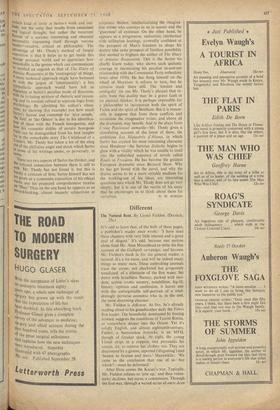Different
Ws odd to learn that, of the bulk of these pages, a publisher's reader once wrote: 'I have read these chapters with very little interest and a good deal of disgust.' It's odd, because one section alone fired Mr. Alan Moorehead to write his fine account of the Gallipoli campaign; and because Mr. Fielden's book. is, for the general reader, a natural. It's a lot more, and will be indeed many things to many men. These enthralling journals trace the career, not checkered but gorgeously tessellated, of a dilettante of the first water. Set down with breathless fluency, packed with inci- dent, action, exotic scenery, notabilities, Trig-lit, history, opinion and confession, it leaves one with the unforgettable self-portrait of a mad- deningly perverse eccentric who is, in the end, the most disarming charmer.
Mr. Fielden is different. At five, he's already reading aloud to his grandmother daily the Times first leader. The household, dominated by fussing women, suggests the conditions of Tzarist Russia, or somewhere ddeper into the Orient. Yet it's solidly English, and almost eighteenth-century.
Father, a humourless Jorrocks, is an MFH, though of Quaker stock. At eight, the young
Lionel strips in a coppice, and persuades his cousin, six, to remove her clothes, too. They are discovered by a groom, reported ('disgusting') and 'beaten to bruises and tears.' Meanwhile : 'We came to the' conclusion that one of us—but which?—must be deformed.'
After Eton comes the Kaiser's war. Typically, Mr. Fielden refuses to 'join up,' and then volun- teers; declines, but earns, a commission. Through the first war, throUgh a varied series of entre deux guerres activities, through the Hitler war and the post-war, the pattern is constant. He declines offers, volunteers for unsuitable assignments; and the more he is faulted or thwarted, the better his recovery He fails his FO interview with a riotous observation about the Balfour Declara- tion. Tonks throws him out of the Slade, where he sits on his donkey between Rex Whistler and Oliver Messel. With the League he has short engagements in Geneva, at the Hague, and later with Nansen in the Balkans. At the Treasury, at the Ministry of Food, there are brief interludes. Anti-war, anti-Establishment, anti-exam, anti- Admin., he ends his career as a gay and veteran AYM in a blaze of affluence in Italy.
Two phases of Mr. Fielden's career are of exceptional interest. He was under Reith in the pioneering days of the BBC. And he went to India, before the withdrawal of the British Raj, to re- organise broadcasting in that sub-continent. These episodes account for the better half of. nearly 400 pages of frequently instructive enter- tainment. On India, Mr. Fielden wrote a book, Beggar My Neighbour, which was the subject of fierce controversy in Horizon, during the Forties, between himself and George Orwell, 'who had a particular dislike of me.
Returning from Alexandria to Marseille on the Kaiser-I-Hind in October, 1918, Mr. Fielden made the acquaintance of another odd man out, whose destiny may be thought to be more bizarrely linked with his own : 'a strange and very unsympathetic figure, wrapped in anger . . . rude and boorish.' It was T. E. Lawrence. They had in common, nevertheless, a rare asceticism about sex. Mr. Fielden makes no bones about calling himself a homosexual. Yet the word is one which may so easily attract and repel readers for the wrong reasons that it seems worth dis- cussing in his own context. Almost engaged, at one period, to .a girl who reciprocated his devo- tion, he says: 'I was convinced that to pass my life with her would be heaven. But I did not, alas, wish to kiss her, fondle her or go to bed with her.' (It was in vain that he sought a cure from Jung in Zurich.) 'If such was my natural bent,' he adds, '1 myself certainly did not bend it or like it that way : it was a crippling deformity.'
An obsession with deformation seems to have led to 'fear of entanglement.' And elsewhere Mr. Fielden propounds a theory that 'when a boy is surrounded in youth by older women whom he reveres, the idea of going to bed with a woman appears to him an act of sacrilege': so that, by the age of thirty, as to sex : 'I decided that I must cut it resolutely out of my life.' To this vow
he attributes the 'disconcerting' effect he is apt to have upon many people. It is to be hoped that the more prejudiced reader will be able to see that here, too, may be the source of that warmth and energy with which Mr. Fielden has irradiated so many walks of life and this account of them, redeemed even in its most exasperating moments by a matchless grace and candour.
HUGH GORDON PORTEUS















































 Previous page
Previous page